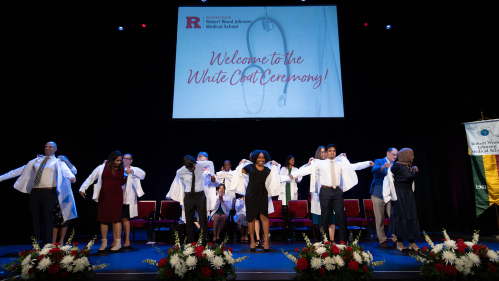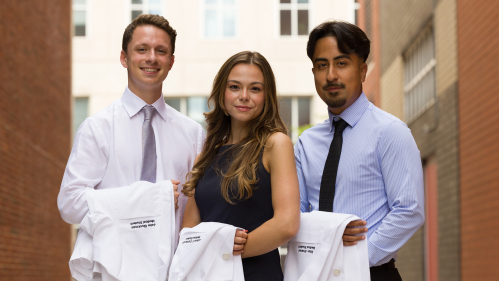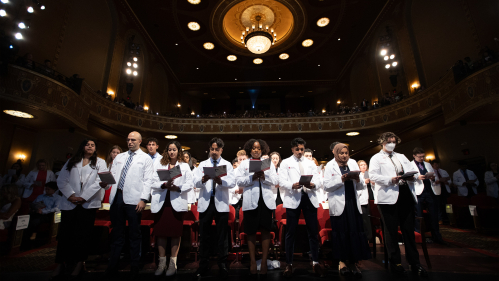At White Coat Ceremony, Students Launch Their Medical Careers

Jake Gluckman was headed for a career in the theater. In addition to having five callbacks for the lead role in Dear Evan Hansen on Broadway, he wrote a musical about his brother, Sam, who has autism.
But delving into his brother’s experiences left him wanting to know and do more about autism and other neurodivergences. After shadowing some physicians during his senior year at Yale, he chose medicine as his path.
“I realized it was this beautiful intersection of science and the humanities that I was really craving,” he said.
Determined to bring his passion for music with him into his career – possibly as a pediatric psychiatrist – Gluckman’s perspective exemplifies the spirit of the annual White Coat Ceremony at Robert Wood Johnson Medical School (RWJMS), which celebrated its newest students July 26 following a weeklong orientation. In addition to receiving their white coats from faculty members, students considered the importance of practicing humanism as they recited the Oath of Hippocrates, a promise to uphold the ethical standards of medicine.
“It feels very much like a symbol that I've made it and that I'm making a promise to myself, my community, my family and my friends to lead and to pursue this profession with compassion and empathy,” Gluckman said.
The RWJMS celebration was the first of two ceremonies welcoming medical students this summer. On Aug. 8, Rutgers New Jersey Medical School (NJMS) will hold its annual Barbara and Norman Seiden White Coat Ceremony to recognize 173 incoming students, but the two schools may celebrate together in the future.
Rutgers is seeking combined accreditation for NJMS and RWJMS, which would establish one of the largest and leading public medical schools in the country, enhance educational opportunities, accelerate scientific discovery and, most importantly, address health inequities with high-quality patient care.
At RWJMS, the ceremony recognized 165 incoming students, including Juliana Cantarutti, who is interested in becoming a pediatric neurologist.
“It’s exciting to be in a room where everyone has a shared goal,” she said, “and also their own unique passions and perspectives about where they want to take medicine.”
Elian Alvarez’s focus was on the sacrifices his family had made to help him pursue his dream of becoming a surgeon.
“I put that white coat on not only for myself, but for my siblings, my mom and dad, and everybody else who has supported me,” he said. “I just hope to make them all proud.”

Amy P. Murtha, dean of RWJMS, urged the incoming class to form a community based on empathy and kindness.
“Today, you commit to our profession, to the joys and challenges of medicine and to treating everyone with respect and honoring their lived experience,” she said. “You also commit to the RWJMS mission to provide high-value, ethical and appropriate medical care.”
With lifelong plans to become a doctor, Cantarutti, of Montgomery, became more determined after she sustained a traumatic brain injury at age 11 and embarked on three years of cognitive recovery, including a year of rehabilitation in an outpatient program at Children’s Specialized Hospital, part of RWJBarnabas Health.
“More than just prescribing me a therapy, my providers cared for my emotional and social needs, and that’s what recharged my will to persevere,” she said. “That's a once-in-a-lifetime connection you can only get through practicing medicine.”
While studying at the College of William and Mary, where she earned a B.S. in neuroscience in 2022, Cantarutti returned to Children’s Specialized to mentor patients, sharing her perspective on life after treatment. Now, after founding For the Ribbons, a nonprofit dedicated to medical debt relief, and conducting a study on color as a learning and memory aid, she’s thrilled “to be trained by the same facility that took care of me, because without it, I wouldn't be sitting here today.”
Alvarez, of Roselle, who earned a B.A. in neuroscience in 2022 and an M.S. in biomedical sciences in 2024 – both from Rutgers University – was also inspired during childhood to enter the medical field. He was impressed by his mother’s rheumatologist, whose successful treatment of her lupus seemed almost like magic, and who worked hard to communicate with her despite a language barrier.
“At first, he needed a translator, but now he speaks to my mother in perfect Spanish,” said Alvarez, who has gained recent experience as a pediatrician’s medical assistant and at RWJ University Hospital in Rahway, where he was a medical scribe. “I would like to be that doctor you can rely on and have that connection with.”

Gluckman, of Short Hills, earned his B.A. in American studies from Yale, with a concentration in theater, in 2021. Under the guidance of a professor there, he created a music program for pediatric inpatients in a psychiatric facility.
“That paved the way for a yearlong fellowship with Hear Your Song, a nonprofit organization that empowers children and teens with serious illnesses and complex health needs to make their voices heard through collaborative songwriting,” said Gluckman, who went on to complete a premedical postbaccalaureate program at Bryn Mawr College and work at an autism center within the Mt. Sinai Health System. “It’s something I want to study more – how health outcomes are affected when kids get to express themselves and take charge of their own stories.”
Keynote speaker Jeanne M. Clark, a 1992 graduate of RWJMS, urged students to provide good care to everyone, learn from their patients and keep their minds open as they define their paths as physicians.
“Be kind to yourselves, your colleagues and all the members of the care team, because the road we have chosen is not an easy one,” said Clark, who runs a primary care practice and serves as the Frederick L. Brancati, MD Professor of Medicine and Epidemiology at The Johns Hopkins University and as director of its Division of General Internal Medicine. “This does not mean going easy on people or overlooking their mistakes, but helping each other and holding each other accountable to do our best in a kind and respectful way.”


